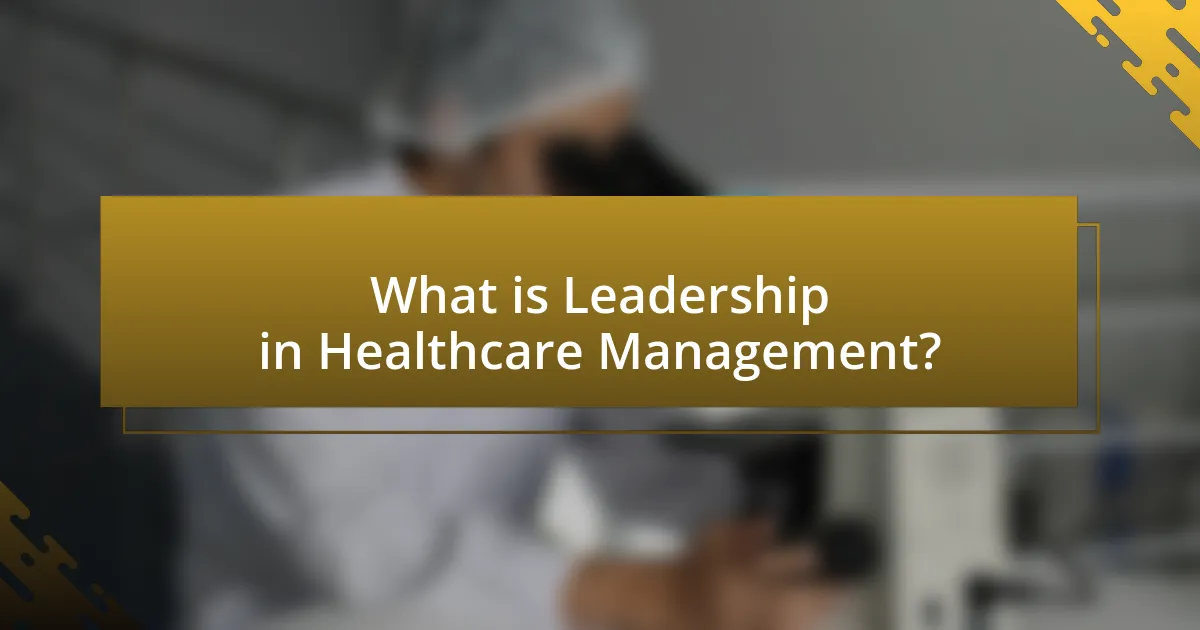Leadership in healthcare management is a critical process that guides organizations toward achieving their goals while ensuring high-quality patient care. This article explores the influence of effective leadership on organizational success, highlighting key characteristics of successful leaders, the impact of leadership styles on team dynamics, and the importance of leadership during crises. Insights from conference speakers emphasize adaptive leadership, effective communication, and collaboration as essential components for improving patient outcomes and organizational performance. Additionally, the article discusses innovative strategies, the role of emotional intelligence, and resources for ongoing leadership development in healthcare settings.

What is Leadership in Healthcare Management?
Leadership in healthcare management is the process of guiding and influencing healthcare organizations to achieve their goals while ensuring high-quality patient care. Effective leadership in this context involves strategic decision-making, fostering teamwork, and navigating complex regulatory environments. Research indicates that strong leadership correlates with improved patient outcomes and organizational performance, as evidenced by a study published in the Journal of Healthcare Management, which found that hospitals with effective leadership teams had 25% lower patient readmission rates.
How does Leadership in Healthcare Management influence organizational success?
Leadership in Healthcare Management significantly influences organizational success by shaping the strategic direction, culture, and operational efficiency of healthcare institutions. Effective leaders foster a collaborative environment that enhances communication and teamwork, leading to improved patient care outcomes. Research indicates that organizations with strong leadership demonstrate higher employee satisfaction and retention rates, which are critical for maintaining quality service delivery. For instance, a study published in the Journal of Healthcare Management found that transformational leadership styles correlate with increased organizational performance metrics, such as patient satisfaction scores and reduced operational costs. Thus, the impact of leadership in healthcare management is evident in both the internal dynamics of the organization and the quality of care provided to patients.
What are the key characteristics of effective healthcare leaders?
Effective healthcare leaders possess key characteristics such as strong communication skills, emotional intelligence, and strategic vision. Strong communication skills enable leaders to convey information clearly and foster collaboration among diverse teams, which is essential in a complex healthcare environment. Emotional intelligence allows leaders to understand and manage their own emotions while empathizing with others, leading to improved team dynamics and patient care. Strategic vision is crucial for anticipating future challenges and opportunities, guiding organizations toward sustainable growth and innovation. Research indicates that organizations led by emotionally intelligent leaders experience higher employee satisfaction and better patient outcomes, reinforcing the importance of these characteristics in effective healthcare leadership.
How do leadership styles impact team dynamics in healthcare settings?
Leadership styles significantly impact team dynamics in healthcare settings by influencing communication, collaboration, and overall team morale. For instance, transformational leadership fosters an environment of trust and motivation, leading to higher engagement and better patient outcomes, as evidenced by a study published in the Journal of Healthcare Management, which found that teams led by transformational leaders reported increased job satisfaction and lower turnover rates. Conversely, autocratic leadership can stifle creativity and reduce team cohesion, negatively affecting performance and patient care. Research indicates that teams under autocratic leaders often experience higher stress levels and lower morale, which can compromise the quality of care provided. Thus, the choice of leadership style directly shapes the effectiveness and harmony of healthcare teams.
Why is Leadership in Healthcare Management critical during crises?
Leadership in Healthcare Management is critical during crises because effective leaders ensure rapid decision-making, resource allocation, and communication, which are essential for managing complex situations. During crises, such as pandemics or natural disasters, leaders must navigate uncertainty and coordinate responses among diverse teams. For instance, during the COVID-19 pandemic, healthcare leaders who implemented clear protocols and fostered collaboration among staff were able to improve patient outcomes and maintain operational efficiency. Studies have shown that organizations with strong leadership during crises experience better resilience and adaptability, highlighting the importance of leadership in guiding healthcare systems through challenging times.
How do leaders navigate challenges in healthcare emergencies?
Leaders navigate challenges in healthcare emergencies by implementing strategic communication, resource allocation, and crisis management protocols. Effective communication ensures that all stakeholders, including staff and patients, are informed and coordinated, which is crucial during emergencies. For instance, during the COVID-19 pandemic, healthcare leaders utilized real-time data sharing and regular updates to maintain transparency and trust. Additionally, leaders prioritize resource allocation by assessing needs and redistributing supplies and personnel to critical areas, as seen in various healthcare systems that adapted to surges in patient volume. Crisis management protocols, such as incident command systems, provide structured responses that enhance decision-making and operational efficiency, evidenced by the successful management of natural disasters in healthcare settings.
What lessons can be learned from past healthcare crises?
Past healthcare crises teach the importance of preparedness, effective communication, and adaptability in leadership. For instance, the COVID-19 pandemic highlighted the necessity for robust emergency response plans and the ability to pivot strategies quickly in response to evolving situations. Historical data shows that countries with pre-established health infrastructure and clear communication channels, such as South Korea during the MERS outbreak, managed crises more effectively. Additionally, the 2003 SARS outbreak demonstrated that timely information sharing among healthcare professionals can significantly reduce transmission rates. These examples underscore that proactive leadership and strategic planning are crucial for managing healthcare emergencies successfully.

What insights have conference speakers shared about Leadership in Healthcare Management?
Conference speakers have emphasized the importance of adaptive leadership in healthcare management, highlighting the need for leaders to be flexible and responsive to the rapidly changing healthcare environment. They have pointed out that effective communication and collaboration among multidisciplinary teams are crucial for improving patient outcomes and fostering a positive organizational culture. Additionally, speakers have shared insights on the significance of data-driven decision-making, which enables leaders to identify trends and implement evidence-based practices. For instance, a study presented at the conference indicated that organizations utilizing analytics in leadership strategies saw a 20% increase in operational efficiency.
How do conference speakers define effective leadership in healthcare?
Conference speakers define effective leadership in healthcare as the ability to inspire and guide teams towards achieving high-quality patient care while navigating complex healthcare systems. This definition emphasizes the importance of communication, collaboration, and adaptability in addressing the dynamic challenges faced in healthcare settings. For instance, speakers often highlight that effective leaders foster a culture of trust and accountability, which is essential for improving patient outcomes and enhancing team performance. Research indicates that organizations led by effective leaders experience higher employee satisfaction and lower turnover rates, further validating the significance of strong leadership in healthcare environments.
What common themes emerge from their presentations?
Common themes that emerge from the presentations on leadership in healthcare management include the importance of effective communication, the need for adaptability in changing environments, and the emphasis on collaborative teamwork. Effective communication is highlighted as essential for fostering trust and transparency among healthcare teams, which is crucial for patient care. Adaptability is underscored as a vital trait for leaders to navigate the complexities of healthcare systems, especially in response to crises like the COVID-19 pandemic. Collaborative teamwork is emphasized as a means to leverage diverse skills and perspectives, ultimately leading to improved patient outcomes and organizational success. These themes are consistently reinforced across various presentations, demonstrating their significance in contemporary healthcare leadership.
How do speakers suggest overcoming leadership challenges in healthcare?
Speakers suggest overcoming leadership challenges in healthcare by emphasizing the importance of effective communication, collaboration, and adaptability. Effective communication fosters transparency and trust among team members, which is crucial in high-stakes environments like healthcare. Collaboration across multidisciplinary teams enhances problem-solving capabilities and leads to better patient outcomes. Adaptability allows leaders to respond swiftly to changing circumstances, such as policy shifts or emerging health crises. Research indicates that organizations with strong communication and collaborative practices experience improved performance metrics, highlighting the validity of these strategies in addressing leadership challenges in healthcare.
What innovative strategies have been proposed by speakers for healthcare leadership?
Innovative strategies proposed by speakers for healthcare leadership include the implementation of data-driven decision-making, fostering a culture of collaboration, and prioritizing patient-centered care. Data-driven decision-making allows leaders to utilize analytics for improving operational efficiency and patient outcomes, as evidenced by studies showing that organizations leveraging data analytics can reduce costs by up to 15%. Fostering a culture of collaboration enhances teamwork and communication among healthcare professionals, which has been linked to improved patient safety and satisfaction. Prioritizing patient-centered care involves engaging patients in their treatment plans, leading to better adherence and health outcomes, supported by research indicating that patient engagement can improve clinical results by 30%.
How can technology enhance leadership effectiveness in healthcare?
Technology enhances leadership effectiveness in healthcare by improving communication, data management, and decision-making processes. Advanced communication tools, such as telemedicine and secure messaging platforms, enable leaders to connect with teams and patients efficiently, fostering collaboration and timely responses. Data management systems, including electronic health records (EHRs), streamline access to patient information, allowing leaders to make informed decisions based on real-time data. Additionally, analytics tools provide insights into operational performance and patient outcomes, empowering leaders to identify areas for improvement and implement evidence-based strategies. For instance, a study published in the Journal of Healthcare Management found that organizations utilizing data analytics reported a 15% increase in operational efficiency, demonstrating the tangible benefits of technology in enhancing leadership effectiveness.
What role does emotional intelligence play in healthcare leadership?
Emotional intelligence is crucial in healthcare leadership as it enhances communication, fosters teamwork, and improves patient outcomes. Leaders with high emotional intelligence can effectively manage their own emotions and understand the emotions of others, which is essential in high-stress environments like healthcare. Research indicates that emotionally intelligent leaders are better at conflict resolution and can create a more positive workplace culture, leading to increased staff satisfaction and retention. For instance, a study published in the Journal of Healthcare Management found that leaders who demonstrated emotional intelligence significantly improved team performance and patient care quality.

What practical lessons can be applied from conference insights on Leadership in Healthcare Management?
Practical lessons from conference insights on Leadership in Healthcare Management include the importance of adaptive leadership, effective communication, and fostering a culture of collaboration. Adaptive leadership allows healthcare leaders to respond to the rapidly changing healthcare environment, as evidenced by the need for flexibility during the COVID-19 pandemic, which highlighted the necessity for leaders to pivot strategies quickly. Effective communication is crucial for ensuring that all team members are aligned with organizational goals, as demonstrated by studies showing that clear communication improves patient outcomes and staff satisfaction. Lastly, fostering a culture of collaboration enhances teamwork and innovation, supported by research indicating that collaborative environments lead to better problem-solving and increased efficiency in healthcare settings.
What best practices can healthcare leaders adopt from conference discussions?
Healthcare leaders can adopt several best practices from conference discussions, including fostering a culture of collaboration, leveraging data analytics for decision-making, and prioritizing patient-centered care. Fostering a culture of collaboration encourages teamwork and innovation, as evidenced by studies showing that collaborative environments lead to improved patient outcomes and staff satisfaction. Leveraging data analytics allows leaders to make informed decisions based on real-time information, which has been shown to enhance operational efficiency and patient care quality. Prioritizing patient-centered care aligns healthcare services with patient needs and preferences, a practice supported by research indicating that such an approach leads to higher patient satisfaction and better health outcomes.
How can leaders foster a culture of collaboration and trust?
Leaders can foster a culture of collaboration and trust by promoting open communication and encouraging team engagement. Open communication allows team members to share ideas and concerns freely, which builds trust and strengthens relationships. Research indicates that organizations with high levels of trust experience 50% higher productivity and 76% higher engagement (Gallup, 2021). Additionally, leaders should model collaborative behaviors, such as actively seeking input from team members and recognizing their contributions, which reinforces a collaborative environment. By implementing regular team-building activities and providing opportunities for cross-departmental collaboration, leaders can further enhance trust and teamwork within the organization.
What strategies can be implemented to improve communication within healthcare teams?
To improve communication within healthcare teams, implementing structured communication protocols is essential. These protocols can include standardized handoff procedures, regular team meetings, and the use of communication tools like electronic health records (EHRs) that facilitate information sharing. Research indicates that structured communication reduces errors and enhances team collaboration, as evidenced by a study published in the Journal of Patient Safety, which found that standardized handoff protocols decreased communication-related errors by 30%. Additionally, fostering a culture of open communication encourages team members to voice concerns and share insights, further enhancing overall team effectiveness.
How can healthcare leaders continue their professional development post-conference?
Healthcare leaders can continue their professional development post-conference by engaging in ongoing education, networking, and applying learned concepts in practice. Ongoing education can include enrolling in relevant online courses or certifications that build on topics discussed at the conference, such as leadership strategies or healthcare innovations. Networking can be enhanced by maintaining connections with fellow attendees and speakers through professional social media platforms like LinkedIn, which facilitates the exchange of ideas and resources. Additionally, applying learned concepts in practice allows leaders to implement new strategies within their organizations, thereby reinforcing their knowledge and contributing to their professional growth. Research indicates that continuous learning and application of new skills significantly enhance leadership effectiveness in healthcare settings.
What resources are available for ongoing leadership training in healthcare?
Ongoing leadership training in healthcare is supported by various resources, including professional organizations, online courses, and mentorship programs. Professional organizations such as the American College of Healthcare Executives (ACHE) offer leadership development programs and certifications that enhance skills and knowledge in healthcare management. Online platforms like Coursera and edX provide courses from accredited institutions, covering topics such as healthcare leadership and management strategies. Additionally, mentorship programs within healthcare institutions facilitate knowledge transfer and skill development through experienced leaders. These resources collectively contribute to the continuous professional growth of healthcare leaders.
How can networking with conference speakers enhance leadership skills?
Networking with conference speakers enhances leadership skills by providing direct access to experienced professionals who can share insights and best practices. Engaging with these speakers allows individuals to gain knowledge about effective leadership strategies, decision-making processes, and innovative approaches in healthcare management. Research indicates that mentorship and exposure to diverse perspectives significantly contribute to the development of leadership competencies. For instance, a study published in the Journal of Healthcare Management found that leaders who actively networked with industry experts reported improved problem-solving abilities and increased confidence in their leadership roles. This interaction fosters personal growth and equips emerging leaders with the tools necessary to navigate complex healthcare environments effectively.

Leave a Reply